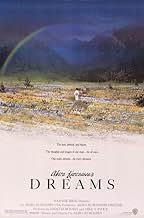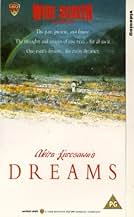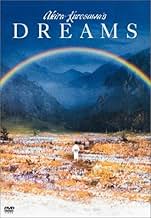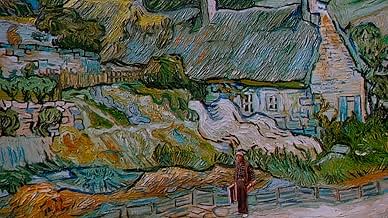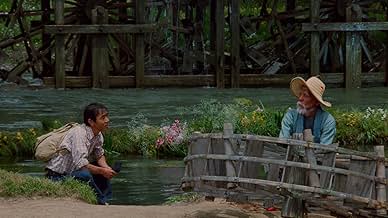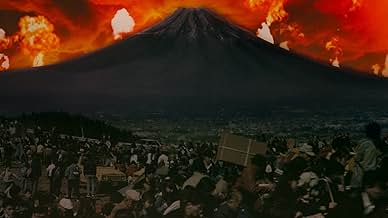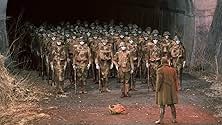NOTE IMDb
7,7/10
31 k
MA NOTE
Une collection de contes basée sur huit des rêves récurrents du réalisateur Akira Kurosawa.Une collection de contes basée sur huit des rêves récurrents du réalisateur Akira Kurosawa.Une collection de contes basée sur huit des rêves récurrents du réalisateur Akira Kurosawa.
- Réalisation
- Scénario
- Casting principal
- Récompenses
- 3 victoires et 12 nominations au total
Avis à la une
Sentimentally I love this film, made by Kurosawa when he was 80 and one of his last. The great director gives us eight vignettes that often seem more like messages than dreams, speaking to the danger of nuclear power, damaging the environment, and senseless death in war. Guilt is a recurring theme, and as the film covers childhood to old age, it seems very personal to Kurosawa's own life. The images are often beautiful, and I absolutely loved dream #5, "Crows," where an art student runs through Van Gogh's paintings and meets him. The highlighted work, "Wheatfield with Crows" is so profoundly meaningful to the end of Van Gogh's life that seeing it here in the elderly Kurosawa's work gave me goosebumps. I didn't mind the preachiness that's in several of the other dreams too much, though it did take away from the film's surreal feeling, but the bigger issue was pace, which was almost always too slow. It's a must-watch film for fans of Kurosawa and I'm glad I saw it, but it needing paring down.
Going back to what made Akira Kurosawa a star, Dreams is a film driven by a completely original concept. Like Rashomon, this is something that had never been done before. To my knowledge, nobody since has had the skill or guts to make a movie that accurately captures the spirit of........ bizarre Dreams. These stories are filmed and written just like real dreams. They're full of strange events that most of the time make no sense, yet everyone in the story totally believes it to be normal.
My favourite segments are "The Tunnel", as story where a former military commander encounters the ghosts of all the soldiers who died under his command. The Commander explaining why his soldiers died is hands down the best acting in the movie. My second favourite wold be "The Peach Orchard". This is about a young boy that finds a group of living dolls in the fields. The dolls are furious that the boy's family have destroyed all the peach tress in the Orchard. This segment was the most dreamlike. My third favourite would be "Mount Fuji In Red". In that there is a nuclear meltdown. Panic spreads and a few survivors contemplate whether or not to end their lives.
In traditional Kurosawa fashion, this movie is visually breathtaking. Kurosawa films don't just look great, they look unique and interesting. The visuals in Dreams helps create the hypnotic dream-like state. In the "Crows" story, a man enters the world of a Van Gogh painting. Parts of the scenery here are natural landscapes, and parts are made to look like a painting. In "Blizzard" mountain climbers are on the verge of death. They're rescued by a snow spirit. The blinding snow and the sort of slow motion effect when you see the Snow Fairy makes this segment perhaps the most hypnotic images Kurosawa has ever produced.
I wouldn't want anyone to get the idea that this is just a bunch of unconnected segments. Several characters appear in various segments, and some are meant to play back to back. I have to say that Dreams may not be for everyone. I'd recommend everyone alive check it out, though. Some may love it, some may not understand it. I'm on the side of this being one of the last brilliant works of the World's greatest Director.
My favourite segments are "The Tunnel", as story where a former military commander encounters the ghosts of all the soldiers who died under his command. The Commander explaining why his soldiers died is hands down the best acting in the movie. My second favourite wold be "The Peach Orchard". This is about a young boy that finds a group of living dolls in the fields. The dolls are furious that the boy's family have destroyed all the peach tress in the Orchard. This segment was the most dreamlike. My third favourite would be "Mount Fuji In Red". In that there is a nuclear meltdown. Panic spreads and a few survivors contemplate whether or not to end their lives.
In traditional Kurosawa fashion, this movie is visually breathtaking. Kurosawa films don't just look great, they look unique and interesting. The visuals in Dreams helps create the hypnotic dream-like state. In the "Crows" story, a man enters the world of a Van Gogh painting. Parts of the scenery here are natural landscapes, and parts are made to look like a painting. In "Blizzard" mountain climbers are on the verge of death. They're rescued by a snow spirit. The blinding snow and the sort of slow motion effect when you see the Snow Fairy makes this segment perhaps the most hypnotic images Kurosawa has ever produced.
I wouldn't want anyone to get the idea that this is just a bunch of unconnected segments. Several characters appear in various segments, and some are meant to play back to back. I have to say that Dreams may not be for everyone. I'd recommend everyone alive check it out, though. Some may love it, some may not understand it. I'm on the side of this being one of the last brilliant works of the World's greatest Director.
Akira Kurosawa's insights on man's need to harmonize with nature, the costs of war and the bad fruits that nuclear power can bear. This is the first Kurosawa movie I have seen, but I can see how true it is that Kurosawa is a master of creating atmosphere in a film. Such as the dark, post-nuclear apocalyptic world of THE WEEPING DEMON. Or the very first episode when the little boy sees something he is not supposed to see in the forest.
I found THE BLIZZARD rather strange, and you'll see a scary part when the mountainman is having his mirage of the beautiful woman who symbolizes the snowstorm. I'm not sure what the significance of the dog was in THE TUNNEL, but I guess it illustrates the fact that though he was the commander of Third Platoon , he felt like a coward because of his command, his men paid the price.... yet he is guilty of still being alive; he's afraid of the dog.
It ends rather low key, but the last episode THE VILLAGE IN THE WATERMILLS is the most insightful and bold in expressing the movie's theme... of harmonizing with nature, and maybe harmonizing with ourselves.
The procession displays the unity and the communal harmony that the villagers have. And it is the exact opposite of what is grieved about in MOUNT FUJI IN RED or THE WEEPING DEMON. The cinematography is just beautiful. The movie is beautiful and captivating.
Akira Kurosawa's YUME is Grade A- 9/10
I found THE BLIZZARD rather strange, and you'll see a scary part when the mountainman is having his mirage of the beautiful woman who symbolizes the snowstorm. I'm not sure what the significance of the dog was in THE TUNNEL, but I guess it illustrates the fact that though he was the commander of Third Platoon , he felt like a coward because of his command, his men paid the price.... yet he is guilty of still being alive; he's afraid of the dog.
It ends rather low key, but the last episode THE VILLAGE IN THE WATERMILLS is the most insightful and bold in expressing the movie's theme... of harmonizing with nature, and maybe harmonizing with ourselves.
The procession displays the unity and the communal harmony that the villagers have. And it is the exact opposite of what is grieved about in MOUNT FUJI IN RED or THE WEEPING DEMON. The cinematography is just beautiful. The movie is beautiful and captivating.
Akira Kurosawa's YUME is Grade A- 9/10
Truly one of the most beautiful films I have ever seen. I saw this film for the first time in 1993 and it was placed forever in my mind as one of my greatest cinematic experiences. I agree with what another reviewer said about this film, that it is not for everyone. It is very artistic in that the cinematography carries a lot of the story and some may become bored with it. Hollywood has a way of brainwashing a lot of viewers into needing a lot of dialog or action. If that's what you're after, you wont find it here. You have to use your brain for this one. This movie is Japanese and what little dialog there is, is in subtitled for the American viewer. So you may need to do a little reading. This is not simply a movie; it is several short, amazing stories that stem from the mind of Akira Kurosawa (a genius in my book). One is like a beautiful fairytale and another is a nightmarish fable and still another is a terribly haunting ghost story, there are others but all are done very well. This film needs to be seen in the letterbox format as it was intended. The cinematography, as I said earlier, contributes so much that it should be viewed completely. I really don't know what else to say about this movie except that if you have an artistic streak and like to see how movies can become art I would highly recommend Yume (Dreams).
More than Just a Dream By Cris Evert Berdin Lato
A series of subconscious peregrinations is not new to the world of cinema. The list is endless when talking about movie plots occurring in dreams. Too often, viewers become so engrossed and thrilled only to find out in the end that “it was all but a dream”. Yet, Akira Kurosawa’s Dreams (Yume) was more of diverting the normal-dream-occurrence-escapade into something worth analyzing and comprehending. It was more of the cinematography rather than the dialog, though there were a number of striking lines worth pondering. Cinematography speaks for the movie itself.
Dreams have woven together the stories of people from different generations. The first two stories Sunshine through the Rain and the Peach Orchard focuses on the little boy (though the 2nd story is not a sequel of the first)—directly telling viewers about childhood. Kurosawa interprets childhood as a period of uncertainty, where one is bound to obedience and is often overcome by innocence and free will.
For those who are not open-minded, Sunshine through the Rain may seem like a showcase of lopsidedness (the mother actually putting more weight on beliefs rather than protecting her own child). The power that culture carries is almost always unstoppable.
The obvious choreography of the foxes was both entertaining and interesting. Entertaining because they look like “out of this world beings” who can’t do anything to straighten their lives. Amazing and interesting because such organization is peculiar for creatures like them.
Peach Orchard on the other hand, tells us about child’s innocence. How hard the boy explained to the imperial spirits that he tried to stop destruction. The story was also about metamorphosis—how a simple and ordinary scenario can turn into something spectacular and extraordinary. Likewise, it tells us about man’s destructive nature and how such abusive act brought so much suffering to the boy. Yes, childhood of uncertainty but this period is also the moment when values are shaped, stain-free, pure and untouched.
For the first two stories, Kurosawa magnificently presented childhood, a stage where thoughts are initially shaped, learnings are taught bit by bit and values are molded.
The next two (The Blizzard and the Tunnel) tackled Kurosawa’s struggle with the self, when an individual seeks his individuality. But such searching happens tumultuously.
When all else fails, one has the tendency to give up and let things be. And just when things get all the worse, you suddenly find the strength to survive.
The Blizzard’s atmosphere was good but I find the scene where the other mountain climbers got up after the storm absurd. Yet I commend the climber who never gave up to his frozen exhaustion.
The most effective story was The Tunnel. Astonishingly, Kurosawa has shown that memories of the past could never be hidden even though it may appear to be forgotten. The Tunnel expresses feelings, memories in retrospect. One cannot be ostentatious—pretending to know nothing or as if nothing happened. “Time cannot ease the pain of old wounds, instead the scars it leaves continues to be seen and serves as a reminder of what has transcribed.”
But I was totally dumbfounded when the dead soldiers obeyed their superior. It was both heartwarming and nerve-breaking.
A major shift happened on the fifth segment Crows. For the previous two movies, the atmosphere has been hazy, cold depicting emotional struggles. With Crows, it was finding one self in solitude, learning from experienced people. Virtually stimulating, Crows invites viewers to get to know Van Gogh’s paintings, as the young Japanese artist likewise “invaded” the world of Van Gogh’s paintings.
As one travels through the sands of time, one also discovers his true self.
As the film moves on, Kurosawa evidently led viewers to a more mature stage. After childhood (Sunshine through the Rain and Peach Orchard), adolescence towards the path of seeking our individuality, to a peaceful self-realization (Crows. Towards the end of the film, Kurosawa introduced man’s role to society. That after finding one’s self, an individual can now relate himself to the society.
Mount Fiji in Red, the Weeping Demon, and the Village of Watermills were all environmentally inclined. It appears succinct that environment is important; yet if one takes more plodding work, one realizes that merely saying how important environment is is truly different from experiencing that importance. As a metascience fiction of visualization of the end of the world, it awakens feelings of guilt and fear.
“Flowers are crippled,” is a very striking statement in The Weeping Demon. It tells viewers how environmental pollution can destroy everything. Among the eight films, I found the title of this segment ironical but appropriate. I’ve never heard of a demon weeping since all I can reckon is a laughing and chuckling one.
Village of the Watermills significantly features a Utopian place, a place where man blends harmoniously with the environment.
Actors of Dreams portrayed roles well although for some segment I found certain dialogues inappropriate and some actors needed more practice. But as a whole Dreams was a movie which invites viewers to dig deeper, to fathom the real meaning of each dream, understanding them both with the mind and the heart. Dreams, a movie which allows viewers to think and analyze more. In the end, all the efforts were rewarded.
A series of subconscious peregrinations is not new to the world of cinema. The list is endless when talking about movie plots occurring in dreams. Too often, viewers become so engrossed and thrilled only to find out in the end that “it was all but a dream”. Yet, Akira Kurosawa’s Dreams (Yume) was more of diverting the normal-dream-occurrence-escapade into something worth analyzing and comprehending. It was more of the cinematography rather than the dialog, though there were a number of striking lines worth pondering. Cinematography speaks for the movie itself.
Dreams have woven together the stories of people from different generations. The first two stories Sunshine through the Rain and the Peach Orchard focuses on the little boy (though the 2nd story is not a sequel of the first)—directly telling viewers about childhood. Kurosawa interprets childhood as a period of uncertainty, where one is bound to obedience and is often overcome by innocence and free will.
For those who are not open-minded, Sunshine through the Rain may seem like a showcase of lopsidedness (the mother actually putting more weight on beliefs rather than protecting her own child). The power that culture carries is almost always unstoppable.
The obvious choreography of the foxes was both entertaining and interesting. Entertaining because they look like “out of this world beings” who can’t do anything to straighten their lives. Amazing and interesting because such organization is peculiar for creatures like them.
Peach Orchard on the other hand, tells us about child’s innocence. How hard the boy explained to the imperial spirits that he tried to stop destruction. The story was also about metamorphosis—how a simple and ordinary scenario can turn into something spectacular and extraordinary. Likewise, it tells us about man’s destructive nature and how such abusive act brought so much suffering to the boy. Yes, childhood of uncertainty but this period is also the moment when values are shaped, stain-free, pure and untouched.
For the first two stories, Kurosawa magnificently presented childhood, a stage where thoughts are initially shaped, learnings are taught bit by bit and values are molded.
The next two (The Blizzard and the Tunnel) tackled Kurosawa’s struggle with the self, when an individual seeks his individuality. But such searching happens tumultuously.
When all else fails, one has the tendency to give up and let things be. And just when things get all the worse, you suddenly find the strength to survive.
The Blizzard’s atmosphere was good but I find the scene where the other mountain climbers got up after the storm absurd. Yet I commend the climber who never gave up to his frozen exhaustion.
The most effective story was The Tunnel. Astonishingly, Kurosawa has shown that memories of the past could never be hidden even though it may appear to be forgotten. The Tunnel expresses feelings, memories in retrospect. One cannot be ostentatious—pretending to know nothing or as if nothing happened. “Time cannot ease the pain of old wounds, instead the scars it leaves continues to be seen and serves as a reminder of what has transcribed.”
But I was totally dumbfounded when the dead soldiers obeyed their superior. It was both heartwarming and nerve-breaking.
A major shift happened on the fifth segment Crows. For the previous two movies, the atmosphere has been hazy, cold depicting emotional struggles. With Crows, it was finding one self in solitude, learning from experienced people. Virtually stimulating, Crows invites viewers to get to know Van Gogh’s paintings, as the young Japanese artist likewise “invaded” the world of Van Gogh’s paintings.
As one travels through the sands of time, one also discovers his true self.
As the film moves on, Kurosawa evidently led viewers to a more mature stage. After childhood (Sunshine through the Rain and Peach Orchard), adolescence towards the path of seeking our individuality, to a peaceful self-realization (Crows. Towards the end of the film, Kurosawa introduced man’s role to society. That after finding one’s self, an individual can now relate himself to the society.
Mount Fiji in Red, the Weeping Demon, and the Village of Watermills were all environmentally inclined. It appears succinct that environment is important; yet if one takes more plodding work, one realizes that merely saying how important environment is is truly different from experiencing that importance. As a metascience fiction of visualization of the end of the world, it awakens feelings of guilt and fear.
“Flowers are crippled,” is a very striking statement in The Weeping Demon. It tells viewers how environmental pollution can destroy everything. Among the eight films, I found the title of this segment ironical but appropriate. I’ve never heard of a demon weeping since all I can reckon is a laughing and chuckling one.
Village of the Watermills significantly features a Utopian place, a place where man blends harmoniously with the environment.
Actors of Dreams portrayed roles well although for some segment I found certain dialogues inappropriate and some actors needed more practice. But as a whole Dreams was a movie which invites viewers to dig deeper, to fathom the real meaning of each dream, understanding them both with the mind and the heart. Dreams, a movie which allows viewers to think and analyze more. In the end, all the efforts were rewarded.
Le saviez-vous
- AnecdotesAkira Kurosawa had trouble getting financing from studios in Japan, blaming much on the political nature of his criticism of nuclear power in the film. He sent a copy of his script to Steven Spielberg, who liked it, and helped get a deal for the film through Warner Bros.
- ConnexionsEdited into Gli ultimi giorni dell'umanità (2022)
- Bandes originalesIn the Village
(from "Caucasian Sketches, Suite for Orchestra Op. 10, No. 2")
Music by Mikhail Ippolitov-Ivanov (as Ippolitov-Ivanov)
Conducted by Vladimir Fedoseyev (as Vladimir Fedoseev)
Performed by Moscow Radio Symphony Orchestra
Meilleurs choix
Connectez-vous pour évaluer et suivre la liste de favoris afin de recevoir des recommandations personnalisées
- How long is Dreams?Alimenté par Alexa
Détails
Box-office
- Budget
- 12 000 000 $US (estimé)
- Montant brut aux États-Unis et au Canada
- 1 963 207 $US
- Montant brut mondial
- 2 970 161 $US
- Durée
- 1h 59min(119 min)
- Couleur
- Mixage
- Rapport de forme
- 1.85 : 1
Contribuer à cette page
Suggérer une modification ou ajouter du contenu manquant



